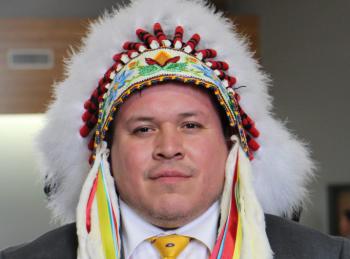Image Caption
Summary
Press Statement:
In response to the COVID-19 coronavirus pandemic, Chiefs of the Southern Chiefs’ Organization (SCO) are declaring a State of Emergency for its 34 member First Nations.
“Due to chronic overcrowding, lack of equitable health care, and poor infrastructure, it is the only prudent step to take”, says Grand Chief Jerry Daniels. “We need to ensure communities have the supports and supplies they need to take prescribed precautions.”
First Nations have yet to receive necessary supplies to respond, and the shortage of health care staff is another significant issue. SCO will continue to meet with Chiefs and federal and provincial officials to monitor the situation and inform its members of any immediate announcements that will affect their communities.
“It is critical during this time that people follow the advice of public health officials. First Nation leaders are taking this situation very seriously and are doing their best to ensure all community members are protected,” said Pine Creek First Nation Chief Karen Batson. “The best advice is to stay at home, support each other, and ensure that all our Elders are taken care of.”
The World Health Organization and the Public Health Agency of Canada indicate that those at highest risk of COVID-19 are 65 and over, have compromised immune systems, or underlying medical conditions. Many First Nation peoples have poorer health outcomes due to complex factors, including a two-tiered health care system. As a result, the lifespans of status First Nation peoples in Manitoba are on average 11-years less than other Manitobans. Lack of equitable health care is a human rights violation that must be addressed.
“We as First Nations and organizations are doing our best to prepare and support each other in this situation we are all in. However, at this important time, there needs to be more communication and support from Government,” said Chief Sheldon Kent of Black River First Nation and Chair of the First Nations Health and Social Secretariat of Manitoba.
Chief Kent added, “First Nation communities in Manitoba have a number of concerns in relation to COVID-19, some of which include access to medical care in a safe and efficient way, protective equipment, and supplies (that were recently announced and not received), and food security. Many of our people do not have optimal health already and are living below the poverty line. First Nation communities are at a high risk as COVID-19 spreads. The Federal Government needs to seriously consider these realities and concerns and assist communities in being prepared with up-to-date information, supplies, and access to funds to ensure the safety and well-being of community members. Now more than ever, we need to work together to support our communities and most vulnerable populations.”
Public health officials are reminding us to frequently wash our hands, cough and sneeze into our sleeves, and practice social distancing to limit the spread of COVID-19, although this is challenging in communities with chronic overcrowding. For the latest updates, please go to: https://www.gov.mb.ca/health/coronavirus/.
SCO announced on Friday, March 13, 2020, that in an abundance of caution it will be postponing all planned SCO events in the immediate future.
The Southern Chiefs’ Organization represents 34 First Nations in what is now called southern Manitoba. SCO is an independent political organization that protects, preserves, promotes, and enhances First Nations peoples’ inherent rights, languages, customs, and traditions through the application and implementation of the spirit and intent of the Treaty-making process.

